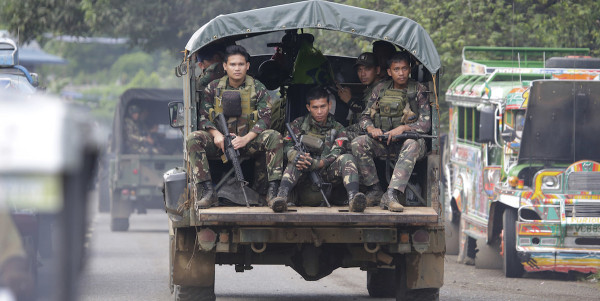

U.S. special operations forces are assisting the Philippine army in its effort to expel ISIS-affiliated militants from the city of Marawi, Reuters reports, signaling a gradual expansion in the scope of the Trump administration’s intensifying campaign against the jihadist.
Lt. Col. Jo-Ar Herrera, a spokesman for the Armed Forces of the Philippines, told the media June 10 that the new U.S. involvement was confined to the Pentagon’s usual “advise and assist” mission, asserting that special operations forces “are not fighting. They are just providing technical support.”
On May 23, 400 local militants claiming loyalty to ISIS stormed the southern capital of the Lanao del Sur province with assistance from “about 40 foreign fights,” Reuters reported. The AFP deployed some 4,000 ground forces backed by attack helicopters and air strikes.
The government declared martial law on May 24, and the jihadists have reportedly “stockpiled weapons and food in mosques, tunnels and basements to prepare for a long siege,’ per Reuters.
“This will be over in about three more days,” Philippine President Rodrigo Duterte announced on June 3 after a visit with wounded AFP troops. “I will not hesitate to use every power available.”
It’s hard to ignore the similarities between the siege of Marawi and another crucial campaign in the war on ISIS. The news came one day after Operation Inherent Resolve confirmed that special operations forces were providing support to the Syrian Democratic Forces and Kurdish militias girding themselves for a months-long siege against ISIS’ de facto capital of Raqqa. And AFP spokesman Herrera’s language appears to echo CJTF-OIR spokesman Col. Ryan Dillon’s June 9 statement that U.S. forces in Raqqa are not “kicking down doors,” suggesting that special operations forces are performing similar ‘advise and assist’ functions in Marawi as in the campaigns against ISIS strongholds in Mosul and Raqqa.
But given the Pentagon’s increasing reliance on SOF to beat back jihadists across the planet — more than 8,000 U.S. Special Operations Command troops are stationed in over 80 countries on any given day — it’s unlikely U.S. forces will remain in a purely support role. And that means the Pentagon may have just opened a new front in the expanding campaign against ISIS.
On its face, deploying special operations forces to the Philippines isn’t that unusual. As Reuters notes, the United States and the Philippines have been strategic allies for decades, a relationship Trump recently affirmed in an April 29 phone call in which he praised Duterte’s embrace of extrajudicial killings to combat the country’s growing drug problem. There appears little possibility of a diplomatic or political kerfuffle that could complicate that bond.
More importantly, the Trump administration may have the legal right to engage ISIS beyond the theater of OIR. The Obama administrations have claimed that the Authorization for the Use of Military Force passed shortly after 9/11 and the 2002 Iraq War Resolution both provide the legal basis not just for pursuing ISIS, which didn’t exist when the legislation was crafted more than 15 years ago, but for targeting the group anywhere the borders of Iraq and Afghanistan.
But the Pentagon’s involvement in the Philippines struggle against ISIS may already be in jeopardy. The day after ISIS jihadists launched their siege of Marawi, U.S. lawmakers introduced a new bipartisan AUMF designed explicitly to place limits on the Pentagon’s ever-expanding 16-year-old campaign against global terrorism.
While the new legislation, introduced by Sens. Jeff Flake, a Republican from Arizona, and Tim Kaine, a Democrat from Virginia, would explicitly authorize military action against al Qaeda, the Taliban, ISIS and “associated persons or forces” who target the United States, it would also establish a system of congressional oversight system to give lawmakers control over which countries (and for how long) military action can actually take place.
The debate around a new AUMF has been growing louder and louder for years as lawmakers and taxpayers alike grow weary of the never-ending conflict against global terror abroad, but new legislation has often failed to make headway in Congress — and until it does, this may just be the beginning of the DoD’s new Philippine campaign against ISIS.